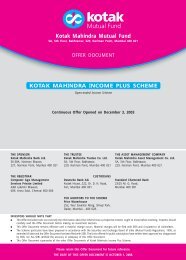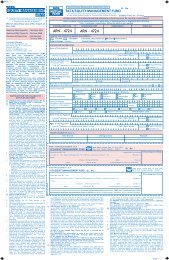OFFER DOCUMENT
Balanced Offer Document - Appuonline.com
Balanced Offer Document - Appuonline.com
- No tags were found...
You also want an ePaper? Increase the reach of your titles
YUMPU automatically turns print PDFs into web optimized ePapers that Google loves.
Prudential ICICI Balanced Fund<br />
VALUATION OF NON-TRADED / THINLY TRADED SECURITIES<br />
Non traded/ thinly traded securities shall be valued “in good faith” by the asset management company on the basis of the<br />
valuation principles laid down below:<br />
(i) Non-traded / thinly traded equity securities:<br />
(a) Based on the latest available Balance Sheet, net worth shall be calculated as follows:<br />
(b) Net Worth per share = [share capital + reserves (excluding revaluation reserves) – Misc. expenditure and Debit Balance in<br />
P&L A/c] Divided by number of Paid up Shares.<br />
(c) Average capitalisation rate (P/E ratio) for the industry based upon either BSE or NSE data (which should be followed<br />
consistently and changes, if any noted with proper justification thereof) shall be taken and discounted by 75% i.e. only<br />
25% of the Industry average P/E shall be taken as capitalisation rate (P/E ratio). Earnings per share of the latest audited<br />
annual accounts will be considered for this purpose.<br />
(d) The value as per the net worth value per share and the capital earning value calculated as above shall be averaged and<br />
further discounted by 10% for ill-liquidity so as to arrive at the fair value per share.<br />
(e) In case the EPS is negative, EPS value for that year shall be taken as zero for arriving at capitalised earning.<br />
(f) In case where the latest balance sheet of the company is not available within nine months from the close of the year,<br />
unless the accounting year is changed, the shares of such companies shall be valued at zero.<br />
(g) In case an individual security accounts for more than 5% of the total assets of the scheme, an independent valuer shall<br />
be appointed for the valuation of the said security.<br />
To determine if a security accounts for more than 5% of the total assets of the scheme, it should be valued by the<br />
procedure above and the proportion which it bears to the total net assets of the scheme to which it belongs would be<br />
compared on the date of valuation.<br />
(ii)(a) Non Traded /Thinly Traded Debt Securities of Upto 182 Days to Maturity:<br />
As the money market securities are valued on the basis of amortization (cost plus accrued interest till the beginning of<br />
the day plus the difference between the redemption value and the cost spread uniformly over the remaining maturity<br />
period of the instruments) a similar process should be adopted for non-traded debt securities with residual maturity of<br />
upto 182 days, in the absence of any other standard benchmarks in the market. Debt securities purchased with residual<br />
maturity of upto 182 days are to be valued at cost (including accrued interest till the beginning of the day) plus the<br />
difference between the redemption value (inclusive of interest) and cost spread uniformly over the remaining maturity<br />
period of the instrument. In case of a debt security with maturity greater than 182 days at the time of purchase, the last<br />
valuation price plus accrued interest should be used instead of purchase cost. All other non traded Non Government<br />
debt instruments shall be valued using the method suggested in (ii)(b).<br />
ii)(b) Non Traded/ Thinly Traded Debt Securities of Over 182 Days to Maturity.<br />
For the purpose of valuation, all Non Traded Debt Securities would be classified into “Investment grade” and “Non<br />
Investment grade” securities based on their credit ratings. The non-investment grade securities would further be classified<br />
as “Performing” and “Non Performing” assets<br />
l All Non Government investment grade debt securities, classified as not traded, shall be valued on yield to maturity<br />
basis as described in the applicable SEBI circular.<br />
l All Non Government non investment grade performing debt securities would be valued at a discount of 25% to the<br />
face value<br />
l All Non Government non-investment grade non-performing debt securities would be valued based on the provisioning<br />
norms.<br />
Valuation of Unlisted Equity Shares:<br />
Unlisted equity shares of a company shall be valued “in good faith” on the basis of the valuation principles laid down below:<br />
a. Based on the latest available audited balance sheet, net worth shall be calculated as lower of (i) and (ii) below:<br />
i. Net worth per share = [share capital plus free reserves (excluding revaluation reserves) minus Miscellaneous expenditure<br />
not written off or deferred revenue expenditure, intangible assets and accumulated losses] divided by Number of<br />
Paid up Shares.<br />
ii. After taking into account the outstanding warrants and options, Net worth per share shall again be calculated and<br />
shall be = [share capital plus consideration on exercise of Option/Warrants received/receivable by the Company plus<br />
free reserves(excluding revaluation reserves) minus Miscellaneous expenditure not written off or deferred revenue<br />
expenditure, intangible assets and accumulated losses] divided by {Number of Paid up Shares plus Number of Shares<br />
that would be obtained on conversion/exercise of Outstanding Warrants and Options}<br />
The lower of (i) and (ii) above shall be used for calculation of net worth per share and for further calculation in (c) below.<br />
35









